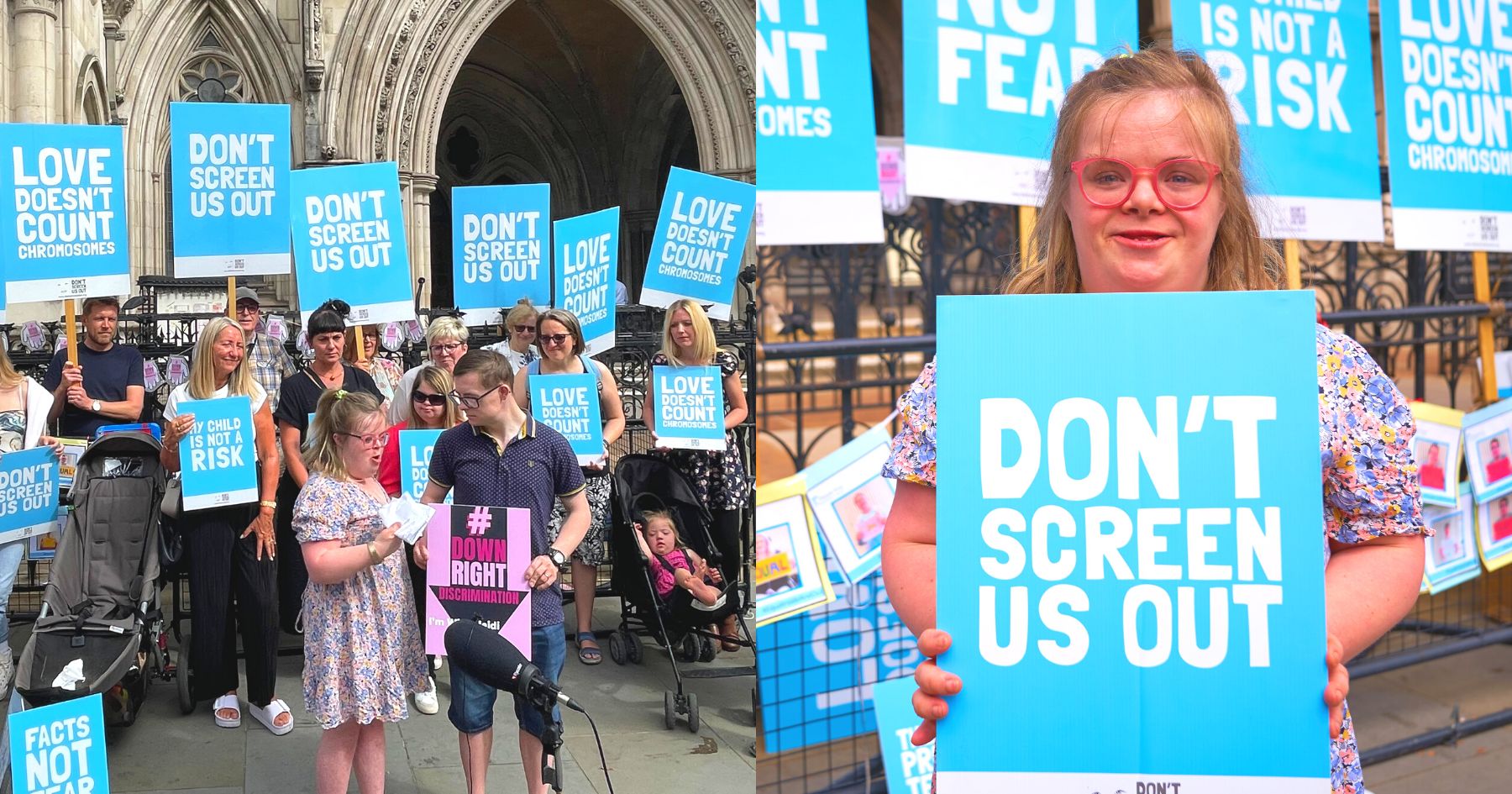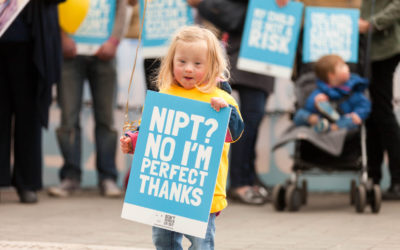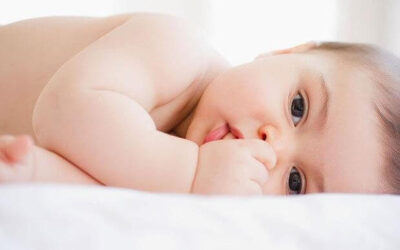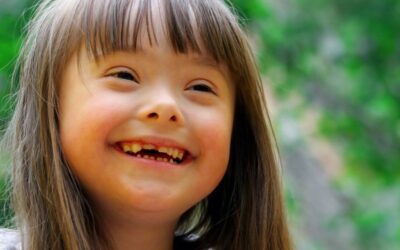PRESS RELEASE – FOR IMMEDIATE RELEASE
Landmark case against UK Govt over discriminatory abortion laws, women with Down’s syndrome vows to fight on
Heidi Crowter, the woman behind a landmark case against the UK Government over the current discriminatory abortion law that allows abortion up to birth for Down’s syndrome, is now considering seeking permission for the case to be taken onto the Supreme Court, after the Court of Appeal announced they have rejected her appeal.
Heidi Crowter, a 27-year-old woman from Coventry who has Down’s syndrome, is challenging the UK Government over a disability clause in the current law.
BACKGROUND
Heidi Crowter is a self-advocate who has campaigned for the last six years for equal treatment for those with Down’s syndrome in all areas of life.
Máire Lea-Wilson was placed under pressure to have an abortion when a 34-week scan revealed her son had Down’s syndrome.
Heidi and her team have crowdfunded over £140,000 for the case.
Currently in England, Wales and Scotland, there is a general 24-week time limit for abortion, but if the baby has a disability, including Down’s syndrome, cleft lip and club foot, abortion is legal right up to birth.
There were 3,370 disability-selective abortions in 2021, a 9% increase from 3,083 in 2020. The number of late-term abortions at 24 weeks gestation or over where the baby has a disability increased by 20% from 229 to 274.
The statistics showed there were 859 abortions where a baby had Down’s syndrome in 2021, an increase of 24% from 2020. The statistics also show a 71% increase in late-term abortions at 24 weeks gestation or over where the baby had Down’s syndrome, increasing from 14 in 2020 to 24 in 2021.
The actual figures are likely to be much higher – a 2013 review showed 886 fetuses were aborted for Down’s syndrome in England and Wales in 2010 but only 482 were reported in Department of Health records. The underreporting was confirmed by a 2014 Department of Health review.
The UN Committee on the Rights of Persons with Disabilities has consistently criticised countries that provide for abortion on the basis of disability.
The Committee on the Rights of Persons with Disabilities’ concluding observations on the initial report of the United Kingdom of Great Britain and Northern Ireland made a key recommendation that the UK change its abortion law so that it does not single out babies with disabilities. The Government has decided to ignore this recommendation.
The Disability Rights Commission (now the Equality and Human Rights Commission) has said that this aspect of the Abortion Act “is offensive to many people; it reinforces negative stereotypes of disability…[and] is incompatible with valuing disability and non-disability equally”.
The 2013 Parliamentary Inquiry into Abortion for Disability found the vast majority of those who gave evidence believed allowing abortion up to birth on the grounds of disability is discriminatory, contrary to the spirit of the Equality Act 2010 and that it affects wider public attitudes towards discrimination. The Inquiry recommended Parliament reviews the question of allowing abortion on the grounds of disability and should consider repealing section 1(1)(d) of the Abortion Act which allows for it.
Disabled peer Lord Shinkwin proposed a Bill in the House of Lords that would have repealed section 1(1)(d) of the Abortion Act – the Bill was undefeated but unfortunately ran out of time. The Bill was supported by Disability Rights UK.
Polling has shown that the majority of people in England, Wales and Scotland feel that disability should not be a grounds for abortion at all, with only one in three people thinking it is acceptable to ban abortion for gender or race but allow it for disability.
Heidi and her legal team have set up a CrowdJustice crowdfunding page to help raise funds for legal proceedings, pay for legal advice and prepare for the case. To find out more and to make a contribution to the next stage of the case visit:www.crowdjustice.com/case/downrightdiscrimination/
Heidi Crowter, from Coventry, who has Down’s syndrome said:
“We face discrimination every day in schools, in the workplace and thanks to this verdict the judges have upheld discrimination in the womb to which is downright discrimination.
When wilberforce wanted to abolish the slave trade he didn’t give up when things didn’t go his way. I won’t give up either because the law should be changed to get rid of a negative focus on Down’s syndrome – even the words used in it are offensive.
This law was made in 1967 when we were not even allowed to go to school because of our extra chromosome , so I think it’s time that the judges move with the times and actually meet people with Down’s syndrome and see the people behind the chromosome.”
Ms Lea-Wilson, 33, an accountant from Brentford, West London and mother to Aidan who has Down’s syndrome said:
People with Down syndrome face discrimination in all aspects of life, with the covid pandemic really shining a light on the dangerous and deadly consequences this can have. This ruling condones discrimination, by cementing the belief in society that their lives are not as valuable as the lives of people without disabilities.
I am surprised and disappointed to see that the ruling gave very little consideration to the feelings of people with Down syndrome and how section 1(1)(d) of the Abortion Act has a very real and painful impact on their self worth and mental health. The judgement also gives very little consideration to the fact that many women, like myself, are pressured to abort much wanted pregnancies at such a late stage in the context of fear and misinformation which is given to them.
I do not regret bringing this case, because I believe it has helped raise awareness around the wonderful lives people with Down syndrome and their families lead, and helped dispel some of the negative, outdated and prejudicial attitudes that are prevalent in society and the medical profession. As Aidan’s mother, I will continue to fight for his rights, and look to appeal this judgement, because equality should be for everyone regardless of the number of chromosomes they have.”
Paul Conrathe, the claimant’s solicitor from Sinclairslaw said:
This judgement is disappointing and perplexing. Rather than affirming the equal value of those with disabilities, it further adds to the stigmatisation they suffer. This is for the simple reason that the court concluded that the perceptions of people with disabilities about a law which allows the ending of a life because of disability are irrelevant. Yet the law protects the unborn without disabilities, leading to the understandable perception that disabled lives are of lesser value or no value at all. Despite this obvious discrimination the court concluded that other people – including people who are not disabled – had a different view of the implications of this legislation and the perceptions and feelings of the disabled could not be relied upon to establish an interference with their human rights. The conclusions of the Court are all the more surprising as Mencap, the leading UK disability charity, had informed the Court that UK abortion law conveyed “ the powerful message that a life with a disability is a lesser life, even a life not worth living. It should have no place in a modern inclusive society that values all people “. Similarly, the UN Committee on the Rights of People with Disabilities recommended that the UK change its abortion law so that it does not stigmatise those with disabilities as having a life of lesser value.
By failing to give legal recognition to the suffering and stigmatisation that people with disabilities feel about a law which singles them out for termination in the womb the Court has further diminished a fragile voice for equal value. Yet again their perceptions are disregarded. My clients are resolute in their fight for the legal recognition of the equal value of people with disabilities and will appeal to the Supreme Court to see this anachronistic and outdated legislation changed.”
Lynn Murray, spokesperson for Don’t Screen Us Out and mother of Rachel who has Down’s syndrome, said:
”Our laws should be supportive of those with Down’s syndrome and their parents, sadly the abortion law as it stands does quite the opposite. Heidi and Maire took up this case simply to ask for a level playing field, to stop the discrimination being perpetuated by section 1.1.d of the abortion law, so it’s very unfortunate that the judgement handed down today doesn’t contribute to any levelling-up.
However, I’m in great awe of Heidi and Maire who’ve raised so much positive awareness by taking on this case, they’ve given hope for the future. It’s been an honour to support them in their efforts and the Don’t Screen Us Out campaign will continue to support going forward should any or both of them decide to take the matter to the Supreme Court.”
ENDS
- For more information on the Don’t Screen Us Out campaign, see our website www.dontscreenusout.org or email info@dontscreenusout.org
- For interviews, contact Don’t Screen Us Out spokesperson Lynn Murray on 07840 966 736 or email info@dontscreenusout.org
- High-resolution photos of Don’t Screen Us Out events which can be used by the media are available here: https://www.flickr.com/photos/dontscreenusout/albums
- Heidi’s Facebook page:
- Previous news coverage featuring Heidi Crowter:
- https://www.bbc.co.uk/news/uk-england-coventry-warwickshire-62152922
- Woman can take Down’s syndrome abortion fight to Court of Appeal | The Independent
- https://www.telegraph.co.uk/news/2020/10/18/woman-downs-syndrome-says-better-dead-eyes-law-ahead-legal-challenge/
- Sky News – https://www.youtube.com/watch?v=Qz0pU7TKqb0
- https://www.dailymail.co.uk/news/article-8351603/Woman-Downs-Syndrome-launches-legal-bid-end-abortion-discrimination.html
- Victoria Derbyshire Show – https://www.youtube.com/watch?v=eeNuWj3xhbM
- Channel 5 News – https://www.youtube.com/watch?v=eeNuWj3xhbM
- https://www.theguardian.com/society/2018/dec/03/my-life-is-just-as-important-as-everybody-elses-meet-the-disability-leaders
- https://www.bbc.co.uk/news/av/45790521/the-23-year-old-busting-myths-about-down-s-syndrome
- https://www.itv.com/news/central/2019-03-21/he-makes-me-the-happiest-girl-in-the-world-twenty-three-year-old-with-downs-on-her-love-life-and-work-wouldntchangeathing-downs-syndrome-world-downs-syndrome-day/
- https://www.huffingtonpost.co.uk/entry/having-downs-syndrome-doesnt-make-me-less-of-a-person_uk
- https://www.dailymail.co.uk/video/news/video-1318649/Heidi-Crowter-s-powerful-s-Syndrome-message-Jeremy-Hunt.html
- Down’s syndrome abortion figures are expected to increase as NIPT is rolled out across hospitals on the NHS. The number of babies born with Down’s syndrome has dropped by 30% in NHS hospitals that have introduced the new test.



